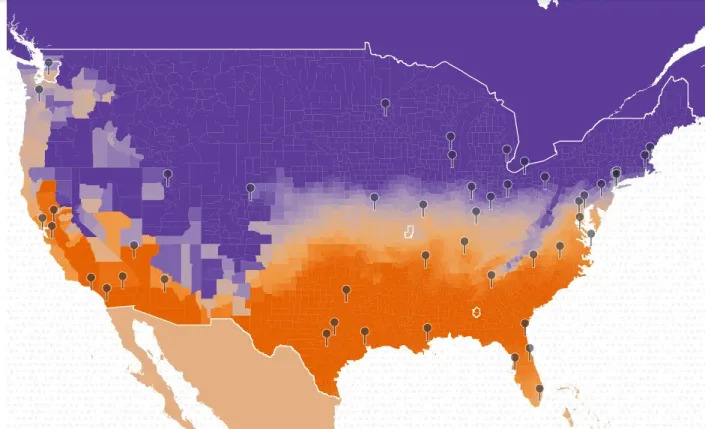Marianne Guenot,Morgan McFall-Johnsen,Jessica Orwig
Fri, March 24, 2023

Auroras in Gaylor, Missouri, on March 24, 2023.NWS Gaylor
A giant "hole" in the sun and solar eruptions blew strong electromagnetic winds toward Earth this week.
That caused the Northern Lights, or aurora borealis, to make a rare appearance in skies across the US.
The colorful lights were seen as far south as Arizona, much further than what was forecast.
Dazzling Northern Lights surprised people across the US overnight when they made a rare appearance in temperate skies.
The colorful, dancing lights are also known as the aurora borealis. They normally occur in the Arctic, but powerful eruptions on the sun caused them to stretch as far south as Phoenix, Arizona before sunrise on Friday, according to images shared by photographers and skywatchers on social media.
The aurora occurs when electrically charged particles stream from the sun and wash over Earth. Our planet's magnetic field channels that "solar wind" to the poles, where the particles interact with molecules in our atmosphere to produce beautiful ribbons of green, pink, purple, and red light.
The National Weather Service had anticipated heightened aurora activity on Friday, possibly as far south as Washington and New York, due to a high-powered solar wind streaming toward our planet from a giant "hole" on the sun, called a coronal hole.

But new, more powerful, eruptions on the sun, called coronal mass ejections (CME), supercharged the solar wind to cause "a severe disturbance in Earth's magnetic field," NWS reported.
It was "a perfect storm," Alex Young, the associate director for science at NASA Goddard's Heliophysics Science Division, told Insider.
As a result, the aurora blew past the forecasts, lighting up the skies in brilliant colors as far south as Missouri, California, Wisconsin, and even Arizona.
Near Phoenix, Arizona

"It was a pretty surreal experience watching the aurora in the Sonoran Desert," John Sirlin, who captured the above photo, told Insider. "It was only visible as a faint pink glow at first but when the pillars started dancing, it was definitely visible to the naked eye. It was brief but stunningly beautiful."
This may be the furthest-south sighting from Friday's aurora events.
"Most people when they're seeing that far south... they're seeing it on the horizon," Young said.
Gaylor, Missouri


Between New York City's John F Kennedy airport and Minneapolis−Saint Paul airport

Topeka, Kansas
La Crosse, Wisconsin

Anchorage, Alaska

Fairfax, Alaska

Fri, March 24, 2023

The Northern Lights appear in the sky on March 23, 2023
A surprise solar storm supercharged auroras across the U.S. and Europe last night (March 23), with sightings of the colorful displays reported from as far south as New Mexico and Arizona.
The storm, classified as a severe G4 on the 5-grade scale used by the U.S. National Oceanic and Atmospheric Administration (NOAA), even forced Rocket Lab to delay a launch of its Electron rocket for 90 minutes. Oddly, space weather forecasters didn't see the storm coming, as it was caused by a stealthy solar eruption.
While the most stunning polar light images came from the usual aurora haunts in Canada, northern Europe and Alaska, ingenious photographers equipped with sensitive cameras were also able to capture the mesmerizing light shows at rather unusual locations at much lower latitudes.
Related: Where to see the northern lights: 2023 aurora borealis guide
Photographer Lauren Thompson took to Twitter to share a series of surprise snaps taken during a night of aurora chasing in New Mexico.
"I can’t believe we are seeing this in New Mexico! Currently somewhere between Pecos and Las Vegas!" she said in one tweet.
Thompson wasn't alone in this southern state to report aurora sightings. Award-winning storm chaser and weather photographer Tim Baca shared his own shot of a fiery wall of red glow emerging above the horizon.
"Central New Mexico Northern lights right now!," he said in the tweet.
Photographers in Arizona, North Carolina and Oklahoma also captured aurora displays, and so did many across the northern states.
"Best night of my life. Near Watertown, South Dakota," tweeted Alex Resel.
Auroras are triggered by interactions between charged particles streaming from the sun in the form of solar wind and molecules in Earth's atmosphere. Because the planet's magnetic field lines funnel the solar particles toward the poles, most aurora displays are only visible at very high latitudes. However, when powerful bursts of solar wind hit the planet at once, such as those released during expulsions of plasma known as coronal mass ejections, auroras can spill over significantly in the direction of the equator. During the most intense solar storms in recorded history, for example, aurora sightings were reported as far south as the Bahamas.



Related stories:
— Where and how to photograph the aurora
— Earth's aurora origin mystery solved by 'surfing' electrons
— Best equipment for aurora photography
Space weather forecasters originally predicted a moderate G2 geomagnetic storm to occur on March 23 and March 24. Such a storm would have invigorated auroras mostly at rather high latitudes. That prediction was based on flows of fast solar wind that forecasters knew were emanating from an opening in the sun's magnetic field known as a coronal hole. The G4 storm that arrived instead was the most powerful geomagnetic storm of the current solar cycle, the 11-year ebb and flow in the generation of sunspots, flares and eruptions.
This solar cycle, the 25th since records began, will reach its maximum in two years, which means we are likely heading into a period of more intense solar storms and therefore more breathtaking aurora displays.
Geomagnetic storms, however, are not always a treat to humans. The more intense ones can cause power blackouts and severely affect operations of orbiting satellites.
Follow Tereza Pultarova on Twitter @TerezaPultarova. Follow us on Twitter @Spacedotcom and on Facebook.











:quality(70)/cloudfront-us-east-1.images.arcpublishing.com/archetype/CI55IATKWNCW3FXRFJKGE2T2JI.jpg)




